by Victoria Bolam
The quality of UC Santa Cruz, or any other institution of higher learning, can be measured in a variety of ways. Surely one important yardstick is the caliber of the people it educates: their thirst for knowledge as students and the manner in which they apply that knowledge after they graduate.
Despite an alumni body that is young by most standards--an 18-year-old freshman in the fall of 1965, UCSC's first year of existence, would have been only 50 this past fall--the contributions UCSC's former students have already made to our society are truly remarkable.
It is our custom to tell the story of one such graduate in each issue of the Review. This time, however, we outdid ourselves, and the pages that follow contain a dozen profiles of alumni who are "new" to this publication.
We hope you enjoy reading their stories as much as we did uncovering them.
University of Colorado, Boulder
Ph.D., biology, '91
(Photo: Ken Abbott/University of Colorado at Boulder)
Patrick Allen is one of the country's leading AIDS/HIV researchers, working since 1995 as principal investigator on a $1.2 million NIH-funded study of the HIV capsid structure (the region containing the viral genetic material) and how the structure relates to infectivity of the deadly virus. Allen was recently surprised to realize that he is the only black scientist funded by the National Institute of Allergic and Infectious Diseases (Division of AIDS) to do AIDS/HIV research--yet more blacks suffer from the disease than any other group in the U.S. To increase the number of black researchers and to improve relations between the African American community and the biomedical field, Allen has launched a campaign he calls the Black Biomedical Research Movement. He's working with fellow scientists to encourage young African Americans to pursue research careers; organizing a broad-based popular media awareness campaign; and pushing for legislativeaction that addresses health issues in the black community.
B.A., psychology/theater arts
Porter '76
B.A., theater arts/fiction writing
Porter '77
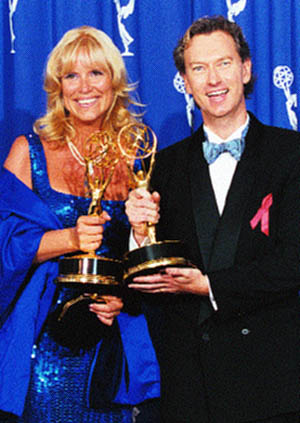
(Photo: Craig T. Mathew)
As writer/producers for the hit TV show Frasier, Chuck Ranberg and Anne Flett-Giordano have reached the top of a highly competitive field, but they don't seem to take it all too seriously. The two have been working as a team since they met at UCSC's Porter College (then College Five) in the 1970s and discovered a shared ambition to become TV writers. Says Ranberg, "We wanted to model ourselves on Buddy and Sally in the Dick Van Dyke Show." Frasier won Outstanding Comedy Series Emmys in each of its first four seasons, and Ranberg and Flett-Giordano took home writing Emmys in 1995 and 1996. Although they say that making it in TV took "longer than we expected as 18-year-olds," the team's path to success was fairly smooth. Their first TV writing job was with Kate and Allie in 1985, and they are currently preparing a new fall series to star Nathan Lane. Ranberg and Flett-Giordano say that working as a team is a big advantage for comedy writers. Flett-Giordano adds, "It's great to have a best friend to serve as a reality check; to bounce jokes off of to see if they're really funny."
B.A., history, Stevenson '70
(Photo: Rex Rystedt)
Since Jayne Ann (Castle) Krentz began writing romance novels in 1980, she's published more than 50 books under her own name and her pseudonym, Amanda Quick. She just celebrated the appearance of her 20th consecutive novel, Sharp Edges, on the New York Times Bestseller List. Krentz is very concerned about public perception of romance novels and has authored an award-winning critical work about her genre, Dangerous Men and Adventurous Women: Romance Writers on the Appeal of the Romance. Says Krentz, "Popular fiction encapsulates and reinforces many of our most fundamental cultural values. Romance is among the most enduring because it addresses the values of family and human emotional bonds." Krentz, a former librarian, has established the Castle Humanities Fund at UCSC's University Library, enabling the library to acquire books that it would not otherwise be able to purchase.
Ph.D., history of consciousness, '82
(Photo courtesy of Bucknell University)
William "Bro" Adams pursued an academic career after leaving UCSC, serving on the faculties of the University of North Carolina at Chapel Hill, Santa Clara University, and Stanford University. At Stanford he met William Chace, who asked Adams to serve as his executive assistant (and later vice president) when Chace became president of Wesleyan University. Adams says he made the transition from academic to administrator with some reluctance, because he enjoyed teaching and research. However, he has found administration extremely rewarding and in 1995 became the 14th president of Bucknell, a prestigious private university in Pennsylvania known for its commitment to undergraduate education. At Bucknell, Adams has helped launch a $150 million fund-raising campaign and overseen development of a strategic financial plan that will carry the campus into the next century. He says it's no coincidence that his career has focused on institutions that share UCSC's dedication to undergraduate liberal arts education: "UCSC decisively shaped my intellectual interests and fostered a strong appreciation for the liberal arts tradition."
B.A., politics, Merrill '76
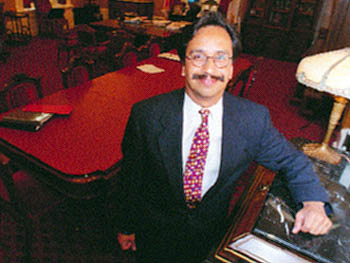
(Photo: Neil Michel/Axiom)
As a UCSC student, Bill Chavez didn't plan on a career in politics, but he was concerned then about many of the same social issues he addresses today in Sacramento. Chavez was editor of the City on a Hill student newspaper at UCSC and active in the California farmworker organizing efforts of the mid-1970s. He went onto work for the Los Angeles County Office of Education and served as a member of the California Student Aid Commission. He now oversees the office and staff of California State Senator Richard Polanco (D-Los Angeles) and advises the senator on education policy. Among their top priorities are funding for schools and parks in urban areas to make cities "more kid-friendly." Chavez, who was recently elected a trustee of the UC Santa Cruz Foundation, hopes to help UCSC develop the enrollment capacity to accommodate the next wave of California students. Says Chavez, "We risk de facto exclusion if we don't step up to the plate."
B.A., sociology, Cowell '68
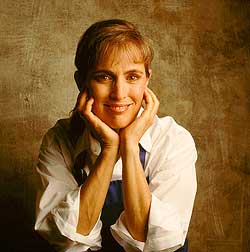
(Photo: William Coupon)
Deborah Madison was among the California chefs who pioneered the use of fresh garden produce in gourmet cooking. She honed her skills at Chez Panisse in Berkeley during the 1970s and in 1979 was the founding chef of San Francisco's Greens restaurant, renowned for its sophisticated vegetarian cuisine. Madison penned The Greens Cookbook and later wrote The Savory Way, which was chosen cookbook-of-the-year by the International Association of Culinary Professionals (IACP). Her newest book, Vegetarian Cooking for Everyone, recently received both IACP and James Beard Foundation awards. While Madison no longer operates her own restaurant, she writes about food and farming and teaches cooking throughout the United States and Canada. She is also actively involved in her local farmers' market in Santa Fe, New Mexico. This summer, she will be a farm apprentice as well as a market manager, "to get my hands back in the dirt and be a student again."
B.A., psychology, Oakes '75
(Photo by Ben Balagot)
Leticia Quezada has pursued a multifaceted career in public service since graduating from UCSC. She was the first Latina elected to the Los Angeles City Board of Education, serving from 1987 to 1994, and was the board's first Latina president. As a board member, Quezada stressed bilingual education, parent empowerment, and school-based management. Quezada was also the first Latina to sit on the L.A. Community College Board, serving from 1985 to 1987. In 1995, she was named president and CEO of the Los Angeles Mexican Cultural Institute, a nonprofit corporation established in 1990 to foster greater understanding between the peoples of Mexico and the U.S. through art, culture, and education. A true binational partnership, the institute sponsors a wide range of educational and cultural events, and its services include a library, a bookstore, and an art gallery that has exhibited works by renowned Mexican artists, including Rufino Tamayo and Frida Kahlo.
Ph.D., psychology, '82
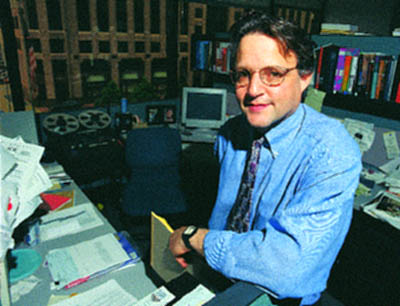
(Photo: Neil Michel/Axiom)
For Joe Palca, science journalism has a lot in common with teaching. It's a chance to share his fascination and delight with science. "After all," he says,"if you can get people interested in statistics--that's what I taught as a graduate student at UCSC--you can get them interested in any science topic." After leaving UCSC, Palca spent four years as a TV producer, then moved into magazine journalism as U.S. news editor for Nature and senior writer with Science. Since joining National Public Radio in 1992, Palca has covered a wide range of science stories--from biomedical research to the Pathfinder landing on Mars. He is special correspondent for the new weekly NPR science program Sounds Like Science and has been guest host of Morning Edition, Weekend All Things Considered, and Talk of the Nation. Palca is the 1998 winner of the American Chemical Society's James T. Grady&endash;James H. Stack Award for Interpreting Chemistry for the Public, and cowinner of a 1997 American Association for the Advancement of Science Journalism Prize for the five-part series, "How the Brain Works." He is also president-elect of the National Association of Science Writers.
B.A., literature, Cowell '77
(Photo: Ben Balagot)
Richard Crowell's Aurora Capital Partners matches venture capital with companies--but it doesn't fund the developing high-tech firms that dominate today's headlines. Instead, it consolidates fragmented segments of more traditional industries, combining small companies into new enterprises that can compete successfully in their niches. Since Aurora Capital Partners was established in 1991, it has created eight new companies--with sales totaling $1.8 billion--out of 56 smaller firms in an eclectic mix of industries, from propane gas distribution, to industrial linen, to wax refining. The capital to create these companies has come primarily from institutional investors and pension funds. Through research, Crowell's firm selects industries that are good candidates for consolidation, then develops partnerships with strong managers, identifies and acquires the right small companies, and oversees the consolidation process. Over three to seven years, the companies develop and grow and are then sold or taken public. Since 1994, for example, Aurora has acquired 14 small companies in the automotive transmission remanufacturing industry and created the leading supplier in the market with $550 million in sales.
B.A., sociology, Cowell '68
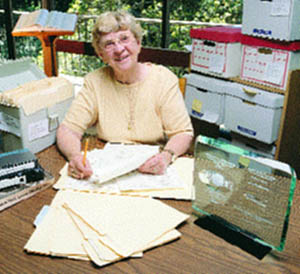
(Photo: r. r. jones)
When Arlene Dorn-Trowbridge transferred to UCSC from Cabrillo College in 1966, she was in her early 40s, which makes her one of UCSC's most senior alumni. She went on to teach in Watsonville's public schools, where many of her students were from migrant farmworker families. She noticed that each year several students left for Mexico in November, not returning until the following spring. "They were at a great disadvantage," she says, "because they arrived in Mexico too late to enroll in schools there." Working with education officials, teachers, and parents on both sides of the border, Dorn-Trowbridge played a key role in developing a standardized student progress form that is recognized as an official transfer document by schools in the U.S. and Mexico. She was also instrumental in changing the fall-only enrollment policy in Mexican schools. Her efforts evolved into the Binational Education Program, a highly regarded U.S.&endash;Mexico partnership, and last year she was honored by the Mexican government for her work. Dorn-Trowbridge is an active UCSC, community, and church volunteer, and currently serves on the steering committee of the new Migrant Agricultural History Archive in University Library's Special Collections.
B.S., biology, Crown '72
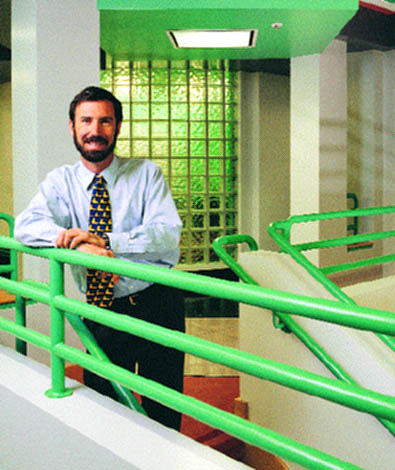
(Photo: r. r. jones)
In 1987, Gordon Ringold gave up a tenured faculty position at Stanford to head the Institute for Cancer and Development Biology at Syntex Research, where he felt he could have a greater impact on disease treatment. Now with Affymax, a Palo Alto pharmaceutical research and development company, Ringold is one of the driving forces behind California's "biotech revolution." Affymax integrates chemistry, molecular pharmacology, engineering, and computer science to develop techniques for synthesizing and screening vast numbers of potential drugs. Ringold says UCSC gave him the flexibility to mold his academic activities and actually design an undergraduate research program, training that prepared him well for graduate work at UCSF with Nobel laureates Harold Varmus and J. Michael Bishop. Ringold is active on UCSC's Deans' Advisory Council, a group of industry leaders building partnerships between the campus and the private sector, and was recently named a trustee of the UC Santa Cruz Foundation. He hopes to "increase awareness of UCSC's excellent technological and scientific capability" and help forge links with industry that benefit the campus.
B.A., music, Cowell '82
(Photo courtesy of Jung-Ho Pak)
Jung-Ho Pak is being hailed as one of the nation's most promising young conductors. He was recently appointed music director of the University of Southern California Symphony and the San Francisco Conservatory of Music. He is also artistic director and principal conductor of the San Diego Symphony and is in his sixth year as principal conductor of the Emmy-nominated Disney Young Musicians Symphony Orchestra. Pak has also served as music director of the International Chamber Orchestra of the Idyllwild Arts Academy (which performed at the 25th anniversary celebration of the John F. Kennedy Center for the Performing Arts) and the critically acclaimed Diablo Ballet of Walnut Creek, California. Pak has been a pioneer in expanding the audience for classical music by developing innovative presentations for a traditional repertoire. He helped initiate the San Diego Symphony's highly successful Classical Rush Hour Series, one-hour programs offered at 6:15 to encourage attendance by downtown workers. With the Spokane Symphony, Pak conducts the Met Series, which features a post-concert question-and-answer session with orchestra members.